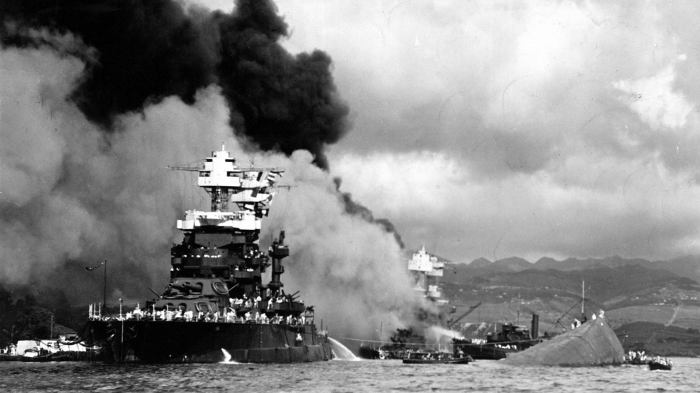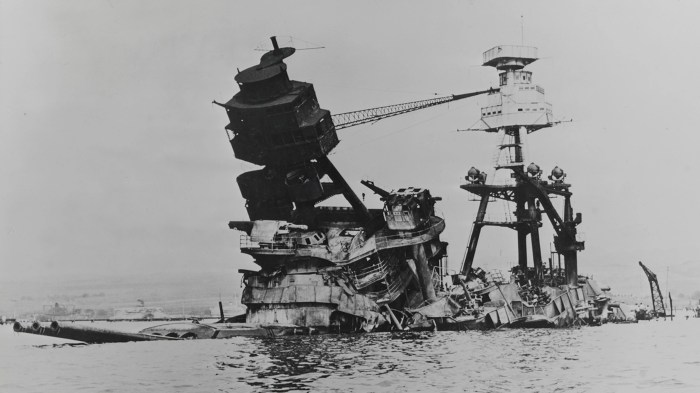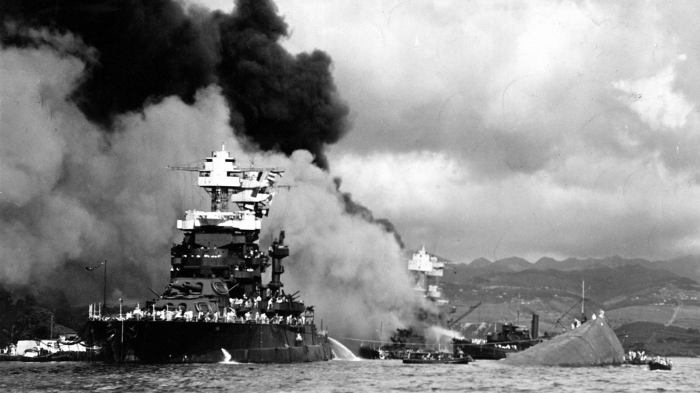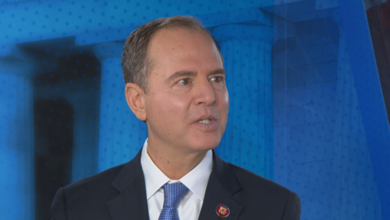
A New Pearl Harbor: The Power of a Phrase
A New Pearl Harbor. The phrase, loaded with historical weight, has become a rhetorical tool, invoked to signify a moment of national crisis. From the original attack on Pearl Harbor in 1941, the phrase has been used to describe events ranging from the Cold War to the 9/11 attacks, each time aiming to evoke a sense of urgency and galvanize public opinion.
This blog post explores the evolution of the phrase “A New Pearl Harbor,” delving into its historical context, its use in political discourse, and its impact on public perception. We’ll examine the power of this phrase to shape public opinion and analyze the ethical considerations surrounding its use.
Historical Context: A New Pearl Harbor

The attack on Pearl Harbor on December 7, 1941, was a pivotal event that irrevocably transformed American foreign policy and propelled the United States into World War II. This act of aggression by the Japanese Empire not only brought about a dramatic shift in American public opinion but also significantly impacted the country’s political and social landscape.
The Significance of the Pearl Harbor Attack on American Foreign Policy
Prior to Pearl Harbor, the United States maintained a policy of neutrality, despite growing tensions with Japan and Germany. The attack shattered this isolationist stance, galvanizing the nation to embrace a global role and become a leading force in international affairs.
The United States emerged from the war as a superpower, with a vast military presence and a commitment to promoting democratic ideals and resisting aggression.
The Political and Social Climate Before and After Pearl Harbor
Before the attack, the United States was deeply divided on the issue of involvement in the war. The isolationist faction, fearing the economic and social consequences of war, advocated for neutrality. However, the attack on Pearl Harbor united the nation, erasing political divisions and generating a strong sense of patriotism and shared purpose.
The social climate also underwent a dramatic transformation. The war effort required widespread mobilization, leading to the mass migration of Americans to industrial centers, the establishment of war production plants, and the creation of a vast military apparatus. Women entered the workforce in unprecedented numbers, filling roles previously dominated by men.
The idea of a “new Pearl Harbor” has become a potent symbol in political discourse, often used to evoke a sense of urgency and justify decisive action. But what happens when this rhetoric is amplified by mainstream media and propaganda ?
The risk is that the truth gets lost in a sea of sensationalism, making it harder to discern real threats from manufactured ones. Ultimately, understanding the true meaning of a “new Pearl Harbor” requires critical thinking and a healthy skepticism towards the narratives we are fed.
The war also fueled a sense of national unity and a willingness to sacrifice for the common good.
The Impact of the Attack on Public Opinion and Mobilization
The attack on Pearl Harbor triggered a wave of shock, anger, and determination among Americans. The public’s perception of Japan shifted dramatically, from a distant threat to a brutal enemy. This shift in public opinion played a crucial role in mobilizing American society for war.
- Public support for the war effort soared, with citizens rallying behind the government’s call to action. This surge in patriotism led to widespread enlistment in the armed forces, volunteerism in civilian defense organizations, and the acceptance of wartime rationing and restrictions.
- The attack also served as a catalyst for national unity, bringing together Americans from all walks of life in a shared commitment to victory. The war effort became a unifying force, transcending racial, ethnic, and socioeconomic divisions.
- The attack also galvanized the American economy, leading to the rapid expansion of war production and the mobilization of industrial resources. This shift towards a war economy transformed the country’s industrial landscape, with factories converting to produce weapons, munitions, and other military supplies.
The Phrase “A New Pearl Harbor”

The phrase “a new Pearl Harbor” has become a potent rhetorical device in American political discourse, often invoked to galvanize support for military action or justify sweeping policy changes. This phrase, rooted in the traumatic memory of the 1941 attack on Pearl Harbor, carries immense historical weight and emotional resonance, shaping public opinion and influencing political decisions.
The Phrase’s Usage in Historical Events
The phrase “a new Pearl Harbor” has been invoked to describe various events throughout history, often to draw parallels to the devastating attack on Pearl Harbor and its consequences. These events, often perceived as sudden, unexpected, and deeply threatening to national security, have been used to justify significant shifts in foreign policy and domestic priorities.
The idea of a “new Pearl Harbor” is a chilling one, a reminder of the fragility of our security and the ever-present threat of unforeseen attacks. But perhaps we’re focusing too much on the threat of large-scale violence, while overlooking the potential for more insidious forms of attack.
Think about the case of Guantanamo Bay, where guantanamo maybe none of them are terrorists – what if the real threat lies not in bombs and bullets, but in the erosion of our freedoms and the chipping away of our democracy?
A “new Pearl Harbor” might not come in the form of a physical attack, but rather in the form of a slow, insidious erosion of our values, leaving us vulnerable and unprepared for the challenges of the future.
- The Cuban Missile Crisis (1962): The discovery of Soviet nuclear missiles in Cuba was seen by many as a new Pearl Harbor, prompting a tense standoff between the United States and the Soviet Union. This event led to the establishment of a direct hotline between the two superpowers and increased efforts to prevent nuclear war.
- The September 11th Attacks (2001): The attacks on the World Trade Center and the Pentagon were widely described as a new Pearl Harbor, triggering the War on Terror and a significant increase in military spending and security measures.
- The 2003 Invasion of Iraq: Some politicians and commentators used the phrase “a new Pearl Harbor” to justify the invasion of Iraq, arguing that Saddam Hussein’s regime posed an imminent threat to the United States. This argument, however, was later criticized for lacking sufficient evidence.
The Rhetorical Function of the Phrase
The phrase “a new Pearl Harbor” functions rhetorically as a powerful tool for persuasion. By invoking the historical memory of Pearl Harbor, it taps into deeply held emotions of fear, anger, and patriotism, creating a sense of urgency and a need for decisive action.
This rhetorical strategy aims to:
- Mobilize Public Opinion:The phrase evokes strong emotions and a sense of shared national threat, rallying public support for a particular course of action.
- Legitimize Policy Changes:By drawing a parallel to a historical event widely seen as a pivotal moment in American history, the phrase can lend legitimacy to policy changes, even those that might be controversial.
- Justify Military Action:The phrase can be used to justify military intervention, often by portraying a situation as an existential threat to national security.
Implications of Using the Phrase
While the phrase “a new Pearl Harbor” can be a powerful tool for persuasion, its use also raises concerns about its potential for misuse and the implications of equating contemporary events to the historical trauma of Pearl Harbor.
- Oversimplification of Complex Issues:Using the phrase can oversimplify complex geopolitical situations, obscuring nuances and reducing multifaceted challenges to a binary framework of threat and response.
- Heightened Nationalistic Sentiment:The phrase can contribute to a heightened sense of nationalism and a perception of “us versus them,” potentially fueling xenophobia and hostility towards perceived adversaries.
- Erosion of Public Trust:Frequent invocation of the phrase, particularly when used for political gain or to justify controversial actions, can erode public trust in political leaders and institutions.
The Use of the Phrase in the 21st Century
The phrase “a new Pearl Harbor” has continued to be used in the 21st century, though its usage has evolved in response to changing global dynamics and political discourse. It’s often invoked to highlight the severity of a perceived threat, drawing parallels to the surprise attack that propelled the United States into World War II.
The phrase “a new Pearl Harbor” evokes images of sudden, devastating attacks. But while physical attacks are frightening, the slow, insidious threat of hunger is equally dangerous. The root causes of hunger are often deeply intertwined with poverty, as explored in this insightful article causes of hunger are related to poverty.
Just as a surprise attack can cripple a nation, widespread hunger can undermine a society’s stability and resilience, making it vulnerable to other threats, both internal and external.
Instances of Use in the 21st Century
The phrase has been invoked in various contexts, from political speeches to media commentary. Some prominent examples include:
- 9/11 Attacks:In the immediate aftermath of the 9/11 attacks, the phrase “a new Pearl Harbor” was widely used to underscore the magnitude of the tragedy and the threat posed by terrorism. President George W. Bush himself used this phrase in a speech to the nation on September 20, 2001.
This use resonated with the public, as it provided a historical framework to understand the scale of the attacks and the need for a decisive response.
- The 2003 Invasion of Iraq:The phrase was also invoked by some in the lead-up to the 2003 invasion of Iraq, drawing parallels between Saddam Hussein’s regime and the threat posed by Japan in the 1940s. This usage, however, was more controversial, as it was used to justify a preemptive war, raising concerns about the misuse of historical analogies for political gain.
- Cyberattacks:In recent years, the phrase has been applied to cyberattacks, particularly those targeting critical infrastructure or government networks. The use of the phrase in this context reflects the growing concern about the vulnerability of modern societies to cyber threats, highlighting the potential for widespread disruption and damage.
The Impact of the Phrase on Public Perception
The phrase “a new Pearl Harbor” carries immense weight, evoking memories of a devastating attack that profoundly shaped American history. Its use in contemporary discourse, while intended to convey the gravity of a situation, can have significant implications for public perception and policy decisions.
The phrase’s power lies in its ability to tap into a collective memory of fear, vulnerability, and a sense of national unity. By invoking this historical parallel, speakers aim to galvanize public support, justify actions, and create a sense of urgency.
The Influence of the Phrase on Public Opinion
The use of “a new Pearl Harbor” can significantly influence public opinion by:
- Heightening Fear and Anxiety:The phrase evokes images of surprise attacks and widespread destruction, prompting feelings of vulnerability and anxiety. This can lead to increased support for security measures and potentially aggressive responses.
- Promoting Nationalism and Patriotism:The phrase can tap into nationalistic sentiments, fostering a sense of unity and shared purpose. This can lead to increased public support for military action and a willingness to make sacrifices in the name of national security.
- Shaping Perceptions of Threats:The comparison to Pearl Harbor can exaggerate the perceived severity of a threat, potentially leading to overreactions and the adoption of policies based on fear rather than careful analysis.
The Influence of the Phrase on Policy Decisions
The phrase’s impact on policy decisions can be seen in:
- Justification for Military Action:By drawing parallels to Pearl Harbor, policymakers can create a sense of urgency and justification for military action, even in situations where a measured response might be more appropriate.
- Increased Spending on Defense:The phrase can lead to increased public support for higher defense spending, potentially diverting resources from other critical areas.
- Expansion of Surveillance and Security Measures:The phrase can be used to justify the expansion of surveillance programs and security measures, even if they infringe on civil liberties.
Ethical Considerations in Using the Phrase
The ethical implications of using “a new Pearl Harbor” are significant:
- Historical Accuracy:The phrase can be misused to trivialize the historical significance of Pearl Harbor and the real human cost of the attack. It’s crucial to avoid using the phrase lightly or in situations that don’t truly warrant such a comparison.
- Potential for Manipulation:The phrase’s emotional power can be exploited for political gain, leading to decisions based on fear and rhetoric rather than careful consideration of the facts.
- Impact on Public Discourse:The overuse of the phrase can desensitize the public to the gravity of real threats and make it more difficult to have reasoned discussions about national security.
Alternative Phrases and Analogies
The phrase “a new Pearl Harbor” has become a potent rhetorical tool, but its overuse has diluted its impact and raised concerns about its appropriateness. Exploring alternative phrases and analogies can provide a more nuanced and impactful way to convey the gravity of various situations.Alternative phrases and analogies can be used to express the urgency and seriousness of a situation without relying on the specific historical context of Pearl Harbor.
These alternatives can also be more inclusive and less likely to evoke negative connotations associated with the attack.
Comparing the Effectiveness of Alternatives
The effectiveness of alternative phrases and analogies depends on the specific context and the desired impact. For example, in a political speech, a speaker might use a more dramatic analogy to evoke a sense of urgency, while in a scholarly article, a more precise and less emotionally charged phrase might be preferred.
- “A defining moment”: This phrase is more general and can be applied to a wider range of situations. It emphasizes the significance of a particular event or decision.
- “A watershed moment”: This phrase suggests a turning point, a moment that marks a significant shift in a situation. It implies that the consequences of the event will be far-reaching.
- “A wake-up call”: This phrase implies a sudden realization of a serious threat or danger. It emphasizes the need for immediate action.
Advantages and Disadvantages of Using Alternative Phrases, A new pearl harbor
Choosing the right phrase is crucial for conveying the intended message effectively.
- Advantages:
- More nuanced communication:Alternative phrases can allow for a more precise and nuanced expression of the severity of a situation.
- Avoiding historical baggage:Using alternative phrases can help avoid the historical baggage and potential offense associated with “a new Pearl Harbor.”
- Greater impact in specific contexts:Alternative phrases can be more effective in certain situations, such as in discussions about climate change or technological advancements.
- Disadvantages:
- Lack of immediate impact:Some alternative phrases might not have the same immediate impact as “a new Pearl Harbor.”
- Potential for ambiguity:Some alternative phrases might be open to interpretation, which could lead to confusion or misunderstanding.






